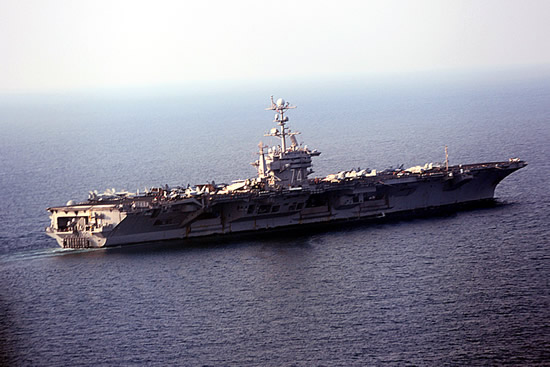
A picture released by Fars News Agency on December 29, 2011, shows a U.S aircraft carrier spotted in an area of the Iranian navy ongoing maneuver zone on the Sea of Oman, near the Strait of Hormuz in southern Iran. UPI/ Abdollah Arab Koohsar/Fars News
Tensions are rising in the Strait of Hormuz. Iran has recently yet again threatened to close the strategic strait down over the threats from the European Union to impose an embargo on buying Iranian oil. The Europeans want to do that as a part of increasing efforts by the West to halt Tehran’s nuclear program.
If Tehran blockades the strait, through which 40 percent of world’s oil is shipped, such an action would have a major impact on the prices of oil and the world economy. Iran has used its oil revenues to export the Islamic revolution and to fund an extensive nuclear weapons program. Yet Iran’s energy sector is also its greatest vulnerability, particularly its need to import gasoline in order to meet its domestic demand.
Iran’s reaction is also a response to the U.S. and European increase of pressure on Iran’s oil and financial sectors. According to a 2007 Heritage Foundation report, a week-long blockade of the strait would result in a 230 percent jump in the price of oil. Historically, that would have been from $65 to $150 per barrel of West Texas Intermediate crude in 2007 prices and from $100 to $230 in today’s prices.
Gross domestic product would fall by over $161 billion in a year, and private non-farm employment would decline by over 1 million jobs over a year and a half. While the close of the strait would drive the price of oil up, Iran would also lose—both because it is dependent on the Strait of Hormuz to export its own crude and because it would be defeated in any direct confrontation with the United States and its allies.
It appears, however, that Iran’s commitment to its nuclear program remains so far unchanged. Ayatollah Ali Khamenei, Iran’s Supreme Leader, recently declared that Tehran would not yield to international pressure to halt its nuclear program: “Sanctions imposed on Iran by our enemies will not have any impact on our nation.” Moreover, Tehran recently expanded its uranium enrichment operations at a new installation carved out of a mountain near Qum and hardened against a possible attack.
The strongest possible sanctions are important but not enough. The U.S. and its allies should deploy sufficient forces in and around the Gulf to ensure that overwhelming military superiority is quickly achievable in case the Iranian regime is foolish enough to mine the Strait of Hormuz. The U.S. should also consult principal oil producers, including the Kingdom of Saudi Arabia and other Gulf states, and main consumers to make sure that there is a coordinated energy policy response in case the Iranian regime miscalculates.






























